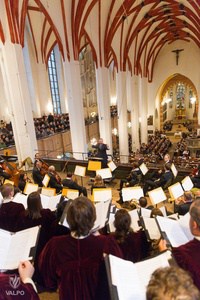
The Valparaiso University Chorale sings at St. Thomas Church in Leipzig on the 500th Anniversary of the Reformation, 31 October 2017. Photo courtesy Valparaiso University.
“Mighty Lord of all Creation,/ Dearest Saviour, O how little carest/ Thou for earthly fame.
Thou whom all men would acclaim,/ Thou in Majesty the Highest,/ In a lowly manger liest.” – Grosser Herr, O starker Koenig, bass aria, Bach’s Christmas Oratorio, Barenreith edition
“And the shepherds returned, glorifying and praising God for all they had heard and see, as it had been told them.”- Luke 2:20 (ESV)
On Tuesday, 31 October 2017, 107 members of VU’s Alumni Reunion Reformation Tour queued up in front of St. Thomas Church in Leipzig, Germany. Since the German government declared this day a national holiday, Dr. Matthew Becker, our tour leader, scheduled our arrival one hour before the service started. By 9:30 AM, no seats remained. Latecomers stood in the aisles. One crisp ring of the glockenschlag calls us to worship. We rise. Choirs, ministers, and liturgists enter. Our mountaintop journey begins!
St. Thomas dates back to the 12th century. Following 100 years of neglect, St. Thomas went through total restoration in 1990. The church measures 76m (249′) long. Also, the nave’s dimensions are 50m long (164′) 25m wide (82′), and 18m high (56′).
On 5 May 1723, St. Thomas appointed Johann Sebastian Bach as Thomaskantor. He held this post until his death in 1750. St. Thomas interred his remains at the top of the chancel steps. People often lay flowers there.
Before Bach started scoring a sheet of music, he scrawled J. J. — Jesu, juva — at the very top. Bach’s notation represented the simplest of prayers – Jesus, help me. Thus, Bach’s cantata’s literally began as prayers. In addition, as he completed each composition, he inscribed the letters SDG – Soli Deo Gloria – to the glory of God alone. Through this inscription, Bach personalized one of the Reformation’s rallying cries. As a result, His life singularly expressed that Latin phrase. As Mark Batterson exhorts in All In, “no one can glorify God like you or for you. Your life is an original score.”
To J. S. Bach, Pastor Batterson notes, the distinction between secular and sacred represented a false dichotomy. Since all things were created by God and for God, no exceptions exist. He’s the mighty Lord of all creation. Therefore, the first tenet of the Westminster Short Catechism states: “Man’s chief end is to glorify God, and to enjoy Him forever.”
Furthermore, in Colossians 3:23 we read – “Whatever you do, work at it with all your heart, as working for the Lord, not for human masters.” Soli Deo Gloria, then, is the why behind every whatever. Thus, our prayers need to focus more on internal attitudes than external circumstances. For all our circumstances present an opportunity to glorify God. And while we tend to thank God for the things that take our breath away, Pastor Batterson encourages us to thank Him for every physical breath we take. Hence, to truly worship and glorify the mighty Lord of all creation, He must dwell within your heart:
“Ah, dearest Jesus, holy Child,/ Prepare a bed, soft, undefiled,/ A quiet chamber set apart/ For You to dwell within my heart.” – Lutheran Service Book #358, verse 14

